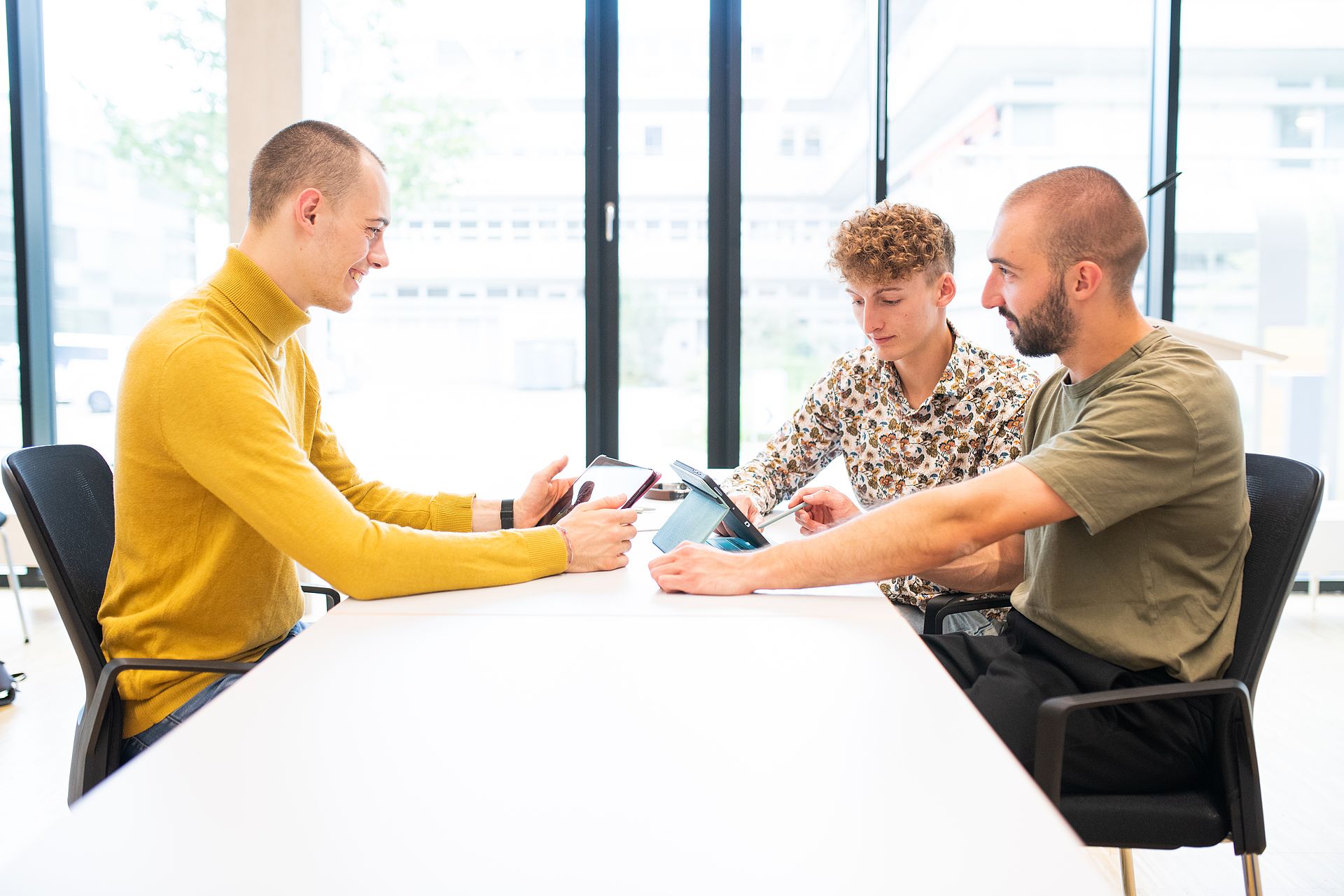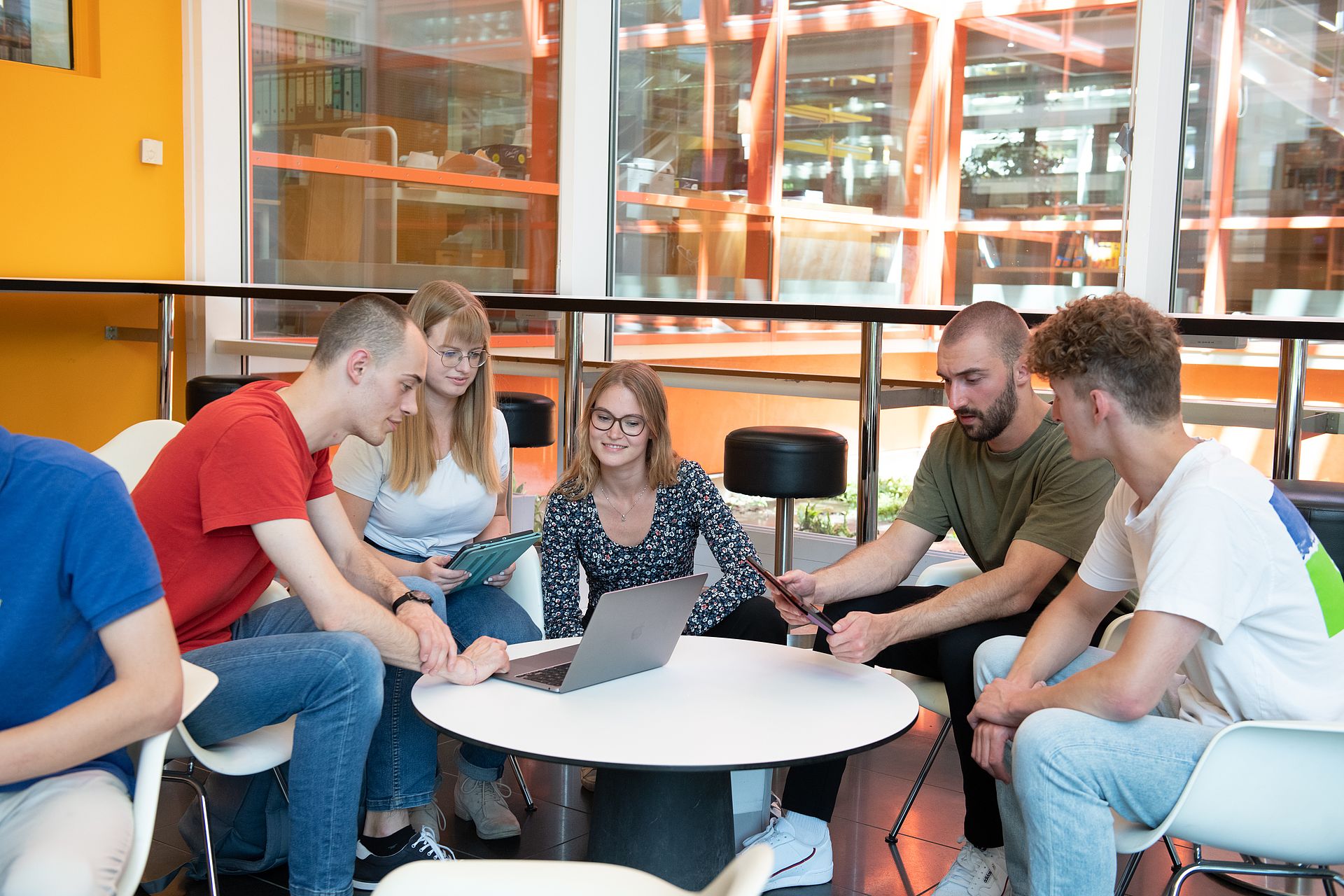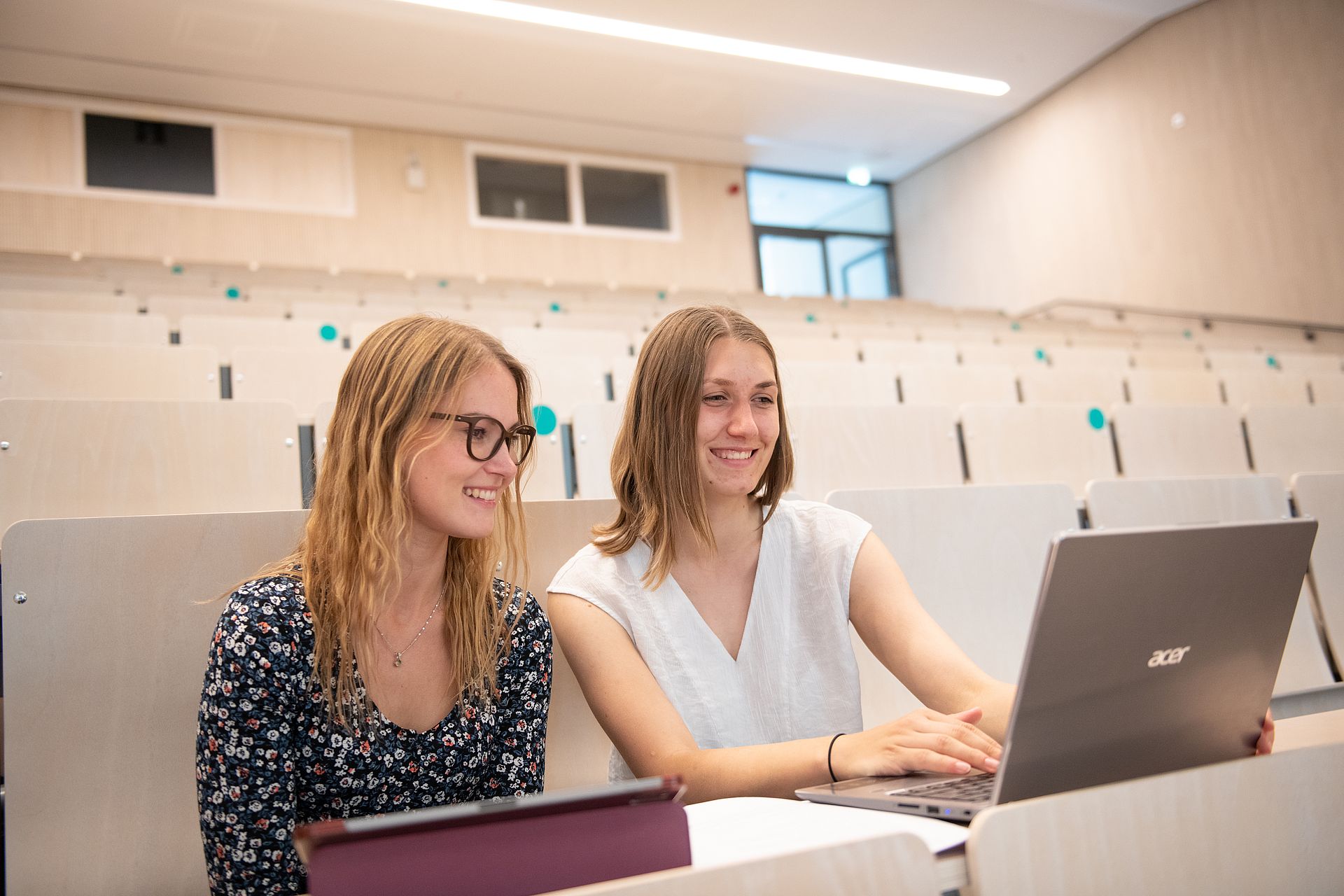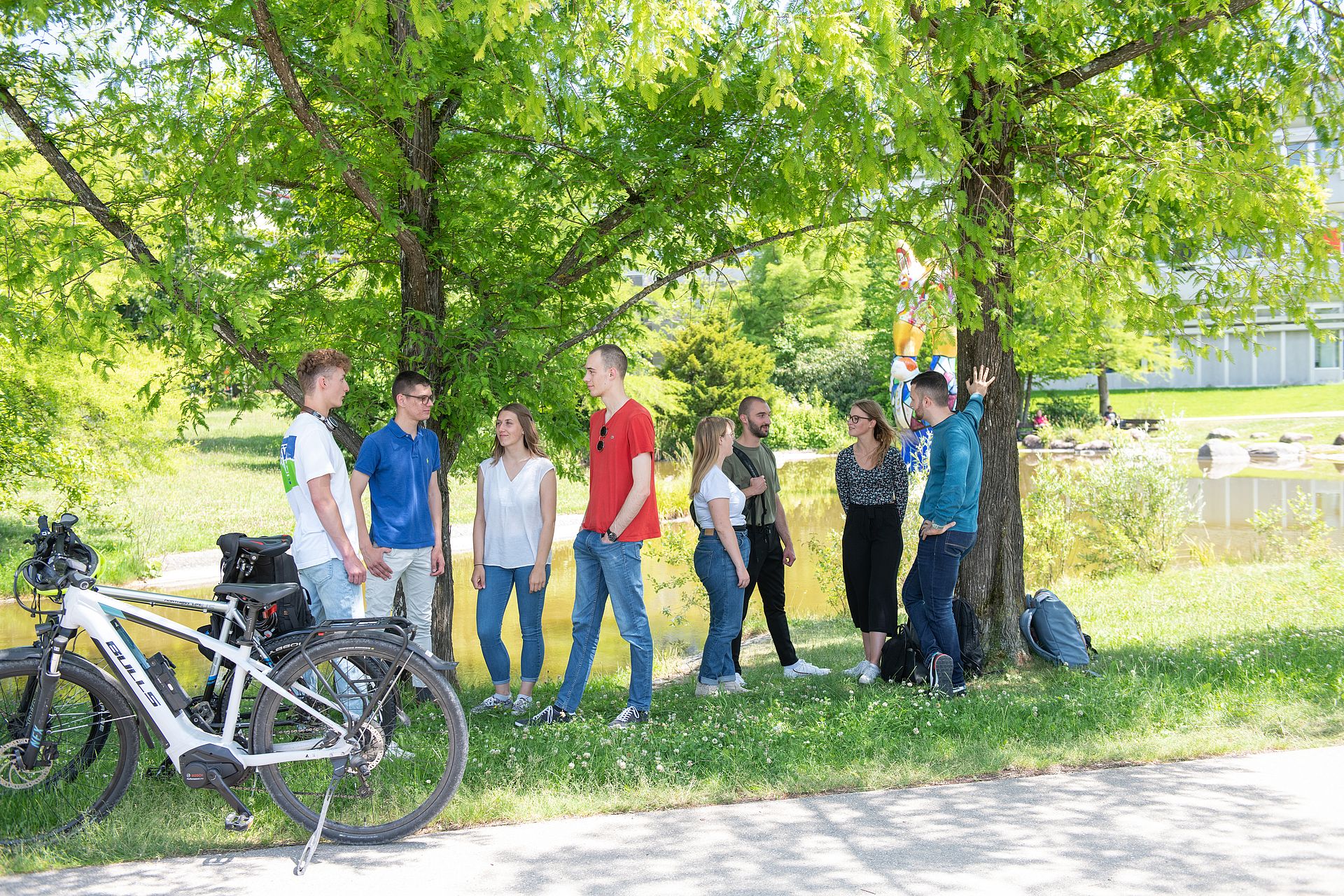
Before the semester
With its focus on STEM (science, technology, engineering, mathematics as well as computer science), medicine, psychology and economics UUlm is training the experts of tomorrow's working world! Seize the opportunity and find out about our study opportunities now.
These so-called Ulm Training Camps are preparatory courses in chemistry and maths and offer newcomers an easier start to their studies! They are always held in September before the start of the winter semester. Important school knowledge and more advanced basics in chemistry are taught and deepened. Participants will also get to know new teaching and learning formats such as lectures, exercises and tutorials. In addition, the camp offers first-year students the opportunity to make contacts and find their way around the University campus.
What is the FUESE all about? The “Fächer übergreifende Erst-Semester-Einführung” (orientation for students of all subjects) aims to help all first-semester students at Ulm University get started at the Uni. Before the official start of studies, "old" students provide an entertaining programme for all "new" students to get to know each other. Of course, the programme also includes exploring the University campus and experiencing the various leisure activities and sights Ulm has to offer, as well as testing out the party factor of Ulm and the Uni.
As a new student, you can take part in a first-semester introduction organised by your department representative. All department representatives organise an ESE (first-semester introduction) that is tailored to the needs of the respective degree programmes. Below you will find an overview of the department representatives and the associated degree programmes.
Dear first semester students and new master students, the new semester will start soon! We are very pleased that you have decided to study at the University of Ulm. On your first day at UUlm, there will certainly be many questions to answer.
The semester opening will take place on April 15, 2024.
Further information
What devices can I use to participate in online events? What software do I need?
Here you will find all the information on the technical equipment you need to succeed in your studies. This answers all questions about technical equipment and tips on how to successfully connect to the internet and participate in the mosaic semester.
Your Student ID card is sent by post with your enrolment documents. Your Student ID serves as a key card on campus, as a library card, identifies you as a student at Ulm University, among other things.
Further information on the chip card
The International Office is the central service unit for international students and offers support in areas such as residence law, student financing and integration as well as for stays abroad during your studies.
For further information on the counselling and support services go to the website of the International Office.
In the Portal Study & Teaching (Studium & Lehre) you can register or deregister for exams, edit your personal data and display and print out study certificates, transcripts of records and module descriptions.
The kiz web portal gives you access to services such as the telephone portal, library catalogue, etc.
Each semester, all students pay the administrative fee and the student services fee as well as the fee for the institutionalised student body (“Verfasste Studierendenschaft”). The total costs currently amount to 180 € per semester.
There are additional tuition fees for some master's degree programmes. Please enquire about this.
Tuition fees are also charged for second degree programmes in Baden-Württemberg; these amount to 650 € per semester.
International students who are not EU citizens are also charged tuition fees of 1,500 € per semester.
The BAFöG and Finances office of the Studierendenwerk (student services) advises and supports students in applying for BAFöG, advises on alternative financing options (student loans or scholarships), or on topics such as working while studying.
Hybrid, online, on site or combined? How are the lectures organised at Ulm University?
Find out more about the background and recommendations for participation here.

The study begins
What is FUESE all about? The “Fächer übergreifende Erst-Semester-Einführung” (orientation for students of all subjects) aims to help all first-semester students at Ulm University get started at the Uni. The "old" students provide an entertaining programme for all new students to get to know each other, explore the university campus and experience the various leisure activities and sights Ulm has to offer. Department representatives clarify the following during the first-semester orientation: How do lectures, associated exercises and compulsory practicals work? What portals and access points are there at Ulm University? What can you do in your free time at the Uni and in Ulm?
Learn more as a first-year student or tutor
Asynchronous teaching is the transfer of academic knowledge both during traditional lectures in presence at the University and via hybrid streamed lectures or recorded courses. The latter can be found in the various courses within Moodle.
The course catalogue in the Portal Study & Teaching (Studium & Lehre) shows which courses are offered in which form in the upcoming semester. The exact start dates of the courses can also be found in the course catalogue.
With your kiz account you can log into Moodle at Ulm University.
Are you looking for a lecture hall, seminar room or lab room? Use the Classroom & Lecture Hall Finder to find your room.
Tip: Use the "eduroam” or "welcome" network at the Uni to display the route on your smartphone.
In addition to the compulsory lectures and seminars, Ulm University offers many other voluntary courses and opportunities to customize your studies. These include courses at the School of Humanities as well as the offers of University Sports and participation in the StuVe (student representatives). Support services from the Zentrale Studienberatung (central student advisory services) and the Studierendenwerk (student services) are also available.
The kiz provides comprehensive support for students during their studies, such as "Fit for the Library" and other courses.
For students

General information regarding studies
The summer semester 2024 starts with the opening of the semester on April 15, 2024. This is also the official start of the lecture period.
The lecture period in the summer semester 2024 ends on July 20, 2024.
Note: Lecture times in cooperative study programs may differ!
More information on the opening of the semester will follow here soon.
You are keen to make a successful start to your studies and meet other students quickly?! Here are the right offers for you: Thanks to our group programmes with a fun factor, procrastination, tight learning schedules or a lack of structure will soon be a thing of the past! During the transition from school to university, we help and inspire you to quickly find your own best study rhythm.
You should find out about the "rules" in your degree programme. Which exams must be completed by when? How often can exams be repeated? You can find this information in the Study and Examination Regulations.
The Zentrale Studienberatung (central student advisory services) is the first point of contact for all questions relating to your degree programme. We support you both in the difficult phases of your studies and in the transition from studying to working life. We are currently available by telephone, video conference (Zoom) or e-mail - please make an individual appointment by email to zentralestudienberatung(at)uni-ulm.de.
In our Moodle course “Learning strategies and working techniques“ we have compiled a lot of information on the subject of learning - with useful tips and ideas.
The course advisors are responsible for all questions relating to studying. They help you plan and pursue your individual course of study and answer questions about timetables.
During the semester, developing a daily structure is crucial for successful study. We will be happy to support you in integrating digital courses and self-study components into your daily routine in an organised manner.
Daily structure
Free time and work for your studies may take place in the same spaces. It is very important to be clear about when you work for your studies and when you have free time. To do this, you should set yourself fixed working hours and ideally enter these in a daily/weekly schedule.
Also be aware of when you start your work; rituals can help here (“Please do not disturb” sign on your room door in the shared flat, "I'm starting now with ..."). Identify time thieves and disruptors, have a notepad ready and make a note of them. Actively look for solutions and write them down as well. Are your strategies working or do you need to find new ones?
Learning breaks
To better retain what you have learnt, plan learning/work intervals with breaks. Regular breaks allow you to concentrate on your work for longer. The ratio between learning and breaks varies greatly between individuals. It is best to start with one of the following schemes and customise it for yourself:
- 25 minutes work - 2 minutes break
- 45 minutes work - 5 minutes break
- 3-4 hours work - 1 to 2 hours break
Critically reflect how well your study-break schedule works for you. During the study break, you should get some exercise and some fresh air, eat and drink and stimulate other senses.
Working environment
Make sure your workplace has plenty of light and sufficient oxygen. Ideally, create a tidy, structured workspace to avoid unnecessary searching. Prepare work packages for the next day (use a daily/weekly plan for this). Here too, critically check whether your workplace meets your work requirements. It is best to take a photo of your workspace and check what needs to be improved. How does your workspace develop over time?
Social activities
Social interaction between students is crucial - stay in contact with your fellow students. Form study groups; by verbalising what you have learned, you can check whether you have really understood the content (your study group will point out any discrepancies and help you).
Social activities should not be limited to learning and working. Organise a games evening with your friends, a cooking evening or simply get together to talk.
THE place where students come to learn is the Central Library of the kiz.
Media can also be collected from the Helmholtzstraße departmental library. Please refer to the information on the kiz website
Each semester, all students pay the administrative fee and the student services fee as well as the fee for the institutionalised student body (“Verfasste Studierendenschaft”).
The total costs currently amount to 180 € per semester.
There are additional tuition fees for some master's degree programmes. Please enquire about this.
Tuition fees are also charged for second degree programmes in Baden-Württemberg; these amount to 650 € per semester.
International students who are not EU citizens are also charged tuition fees of 1,500 € per semester.
Dear Students
We must expressly point out to you that it is not permitted to redistribute materials made available to you via Moodle or other means (e.g. lecture recordings, scripts, slides, etc.). The materials that your lecturers make available to you are intended exclusively for use by the participating students in the respective course!
We kindly ask you to observe these regulations.
The International Office is the central service unit for international students and offers support in areas such as residence law, student financing and integration, as well as for stays abroad during your studies.
Further information on the counselling and support services can be found on the website of the International Office.
Numerous university groups offer the chance to socialise with other like-minded people and engage in both fun and serious activities together. The StuVe (student representative body) also offers students the opportunity to help shape university life and some of the regulations at the university.
The University Sports Centre, the Centre for the Arts (MUZ)and the Humboldt Study Centre offer other activities to help you clear your head after a hard day's studying.
Another big part of university life naturally takes place at the numerous events and parties at the University and in Ulm's cosy old town or in the many different clubs.

Study-related offers
Visit our workshops and events for students at Ulm University.
Feel free to contact us at any time if you have further questions about studying. The programme for winter semester 23/24 will be posted online in the coming weeks.
All ZSB events for students
Centre for the Arts (MUZ)
Uni Cinema
University Sports
Parties on campus
Events calendar of the StuVe
Bicycle repair shop, theatre flat rate and many other StuVe services can be found here
Need a break from all that studying? Then University Sports is just right for YOU! With a diverse range of courses, Ulm University Sports offers a wide variety of activities: from ball sports such as football or handball to Pilates, yoga or Zumba, various martial arts, dance courses, climbing and winter sports - there is something for everyone.
A university would not be a university if the natural sciences, medicine and technology were not complemented by the humanities and languages. The School of Humanities offers programmes that go beyond your specialist studies, broadening your horizons, your skills and thus your career prospects. All courses take place at lunchtime, in the evening and as compact seminars and are suitable for all subjects without any prior knowledge.
The Humboldt Study Centre offers courses in philosophy, politics and contemporary history which you can credit to your subsidiary subject or as transferable skills (ASQ). There are also special ethics courses or the module "Personal Competence". As transferable skills (ASQ) in the narrower sense, there are courses on, among others, time management and dealing with stress.
The Centre for Languages and Philology is dedicated to deepening and expanding foreign language skills and developing intercultural competencies. The courses offered by the Language Centre can also be credited as ASQ courses.
These offers are fun, worthwhile and you take a lot with you!
If you're looking for a job alongside your studies (or even supplementary work as part of your studies), you'll definitely find something here:
To the Job offers for student/research assistants
Student reps Biosciences
Student reps Chemistry/Chemistry and Management
Student reps CSE
Student reps Electrical Engineering
Student reps Computer Science
Student reps Teacher Education
Student reps Mathematics
Student reps Molecular Medicine + Life Sciences
Student reps Medicine
Student reps Physics and Physics and Management
Student reps Psychology
Student reps Management and Economics
You can’t find the information you need? You have a problem attending a course or a technical problem? We are happy to assist you!
Our new Instagram channel provides a wealth of information for all prospective students of Ulm University and the city of Ulm. Of course, all current students are also very welcome. Subscribe now
Please send us an email if you have any requests for changes or additions.
